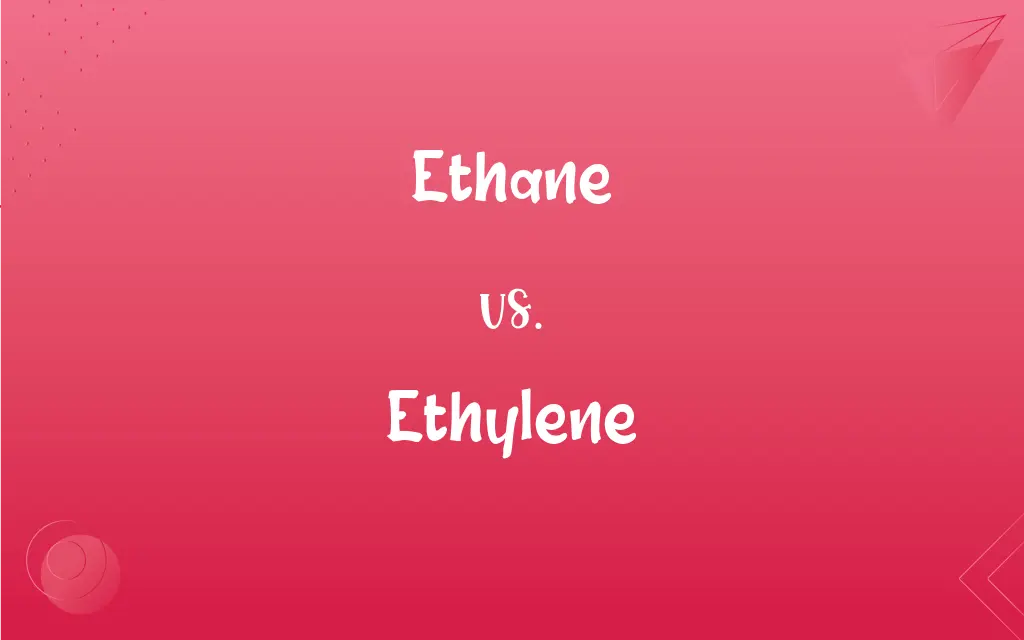Ethane vs. Ethylene: What's the Difference?
Edited by Janet White || By Harlon Moss || Updated on November 6, 2023
Ethane is a saturated hydrocarbon with single bonds (C2H6), while ethylene (C2H4) is unsaturated with a double bond between carbon atoms.

Key Differences
Ethane is a chemical compound that consists of two carbon atoms single-bonded to each other, with each carbon atom also bonded to three hydrogen atoms, giving it the formula C2H6. It is one of the simplest forms of hydrocarbons known as alkanes, which are characterized by single bonds between carbon atoms and a full saturation of hydrogen atoms.
Ethylene, also known by its IUPAC name ethene, is a hydrocarbon which has the chemical formula C2H4. Unlike ethane, it contains a double bond between its two carbon atoms. This double bond is what classifies ethylene as an alkene, which is a type of hydrocarbon that contains at least one carbon-carbon double bond, making them unsaturated.
When it comes to chemical reactivity, ethane is relatively inert due to its single bonds and saturated nature. It does not easily participate in addition reactions, which are typical of unsaturated compounds. Ethane is mainly used as a fuel and is a part of natural gas.
Ethylene is much more reactive because of its double bond, which can easily break and form new bonds in addition reactions. It is widely used in the chemical industry, particularly in the production of polyethylene, one of the most common plastics. Ethylene is also a plant hormone that promotes fruit ripening.
The physical properties of ethane and ethylene also differ. Ethane is a colorless, odorless gas under standard conditions and has a relatively low boiling point. Ethylene is also a colorless gas, but it has a sweet smell and a slightly higher boiling point than ethane due to its double bond.
ADVERTISEMENT
Comparison Chart
Chemical Formula
C2H6
C2H4
Type of Hydrocarbon
Alkane (saturated)
Alkene (unsaturated)
Carbon-Carbon Bonds
Single bonds
Double bond
Chemical Reactivity
Lower reactivity
Higher reactivity
Industrial Use
Fuel, feedstock
Production of plastics, plant hormone
ADVERTISEMENT
Ethane and Ethylene Definitions
Ethane
A colorless, odorless gas used as fuel.
Natural gas contains a significant amount of ethane.
Ethylene
A colorless gas with a sweet odor, used in the chemical industry.
Ethylene is essential in the production of polyethylene plastic.
Ethane
A flammable gas found in natural gas deposits.
They extracted ethane and propane from the natural gas.
Ethylene
An unsaturated hydrocarbon with the formula C2H4.
Ethylene gas is produced as a byproduct in oil refineries.
Ethane
A saturated hydrocarbon with single covalent bonds.
Ethane molecules are stable due to their saturated bonds.
Ethylene
A plant hormone that regulates fruit ripening.
Apples release ethylene, which can ripen other fruit.
Ethane
The simplest alkane with the chemical formula C2H6.
Ethane is often produced during the refining of petroleum.
Ethylene
The simplest alkene with a double bond between carbon atoms.
The double bond in ethylene is reactive and can undergo addition reactions.
Ethane
A gaseous hydrocarbon used in organic synthesis.
Ethane can be cracked to produce ethylene and hydrogen.
Ethylene
A hydrocarbon used as a monomer in polymerization processes.
Ethylene is polymerized to form long chains of polyethylene.
Ethane
A colorless, odorless gaseous alkane, C2H6, that occurs as a constituent of natural gas and is used as a fuel and a refrigerant.
Ethylene
A colorless flammable gas, C2H4, derived from natural gas and petroleum and also occurring as a natural plant hormone, used as a source of many organic compounds, in welding and cutting metals, to ripen citrus fruits, and as an anesthetic. Also called ethene.
Ethylene
(organic compound) The common name for the organic chemical compound ethene. The simplest alkene, a colorless gaseous (at room temperature and pressure) hydrocarbon with the chemical formula C2H4.
FAQs
What is ethane commonly used for?
It's used as a fuel and a petrochemical feedstock.
Is ethylene a gas at room temperature?
Yes, it is a colorless gas.
What is ethylene's primary industrial use?
It's used mainly in the manufacture of plastics.
What makes ethylene reactive?
The double bond between its carbon atoms.
Do ethane and ethylene have the same molecular weight?
No, ethylene is lighter due to fewer hydrogen atoms.
Can ethane be used to make plastics like ethylene?
Indirectly, as it can be converted into ethylene for plastic production.
How does ethane react in the presence of a flame?
It burns to produce water and carbon dioxide.
Why is ethylene important in agriculture?
Because it acts as a plant hormone to regulate growth and ripening.
Can ethane be found in natural gas?
Yes, it's a significant component of natural gas.
What happens when ethane is cracked?
It breaks down into ethylene and hydrogen, among other products.
How are ethane and ethylene similar?
They both contain two carbon atoms and are hydrocarbons.
Why is ethylene called a 'building block' in the chemical industry?
Because it's a precursor to many chemicals and plastics.
Is ethane reactive?
No, it's relatively unreactive due to its saturated structure.
Is ethylene used in food production?
Yes, it's used to ripen fruits commercially.
Are there any risks associated with ethane?
Like many gases, it's flammable and can be an asphyxiant in high concentrations.
What are the boiling points of ethane and ethylene?
Ethane boils at -88.6°C, while ethylene boils at -103.7°C.
Are ethane and ethylene considered clean energy sources?
They burn cleaner than coal, but are still fossil fuels.
Can ethylene be naturally found in the environment?
Yes, it's produced by plants and some fruits.
Is ethane harmful to the environment?
It can contribute to greenhouse gas emissions.
Can ethane be converted into ethylene?
Yes, through a process called steam cracking.
About Author
Written by
Harlon MossHarlon is a seasoned quality moderator and accomplished content writer for Difference Wiki. An alumnus of the prestigious University of California, he earned his degree in Computer Science. Leveraging his academic background, Harlon brings a meticulous and informed perspective to his work, ensuring content accuracy and excellence.
Edited by
Janet WhiteJanet White has been an esteemed writer and blogger for Difference Wiki. Holding a Master's degree in Science and Medical Journalism from the prestigious Boston University, she has consistently demonstrated her expertise and passion for her field. When she's not immersed in her work, Janet relishes her time exercising, delving into a good book, and cherishing moments with friends and family.































































